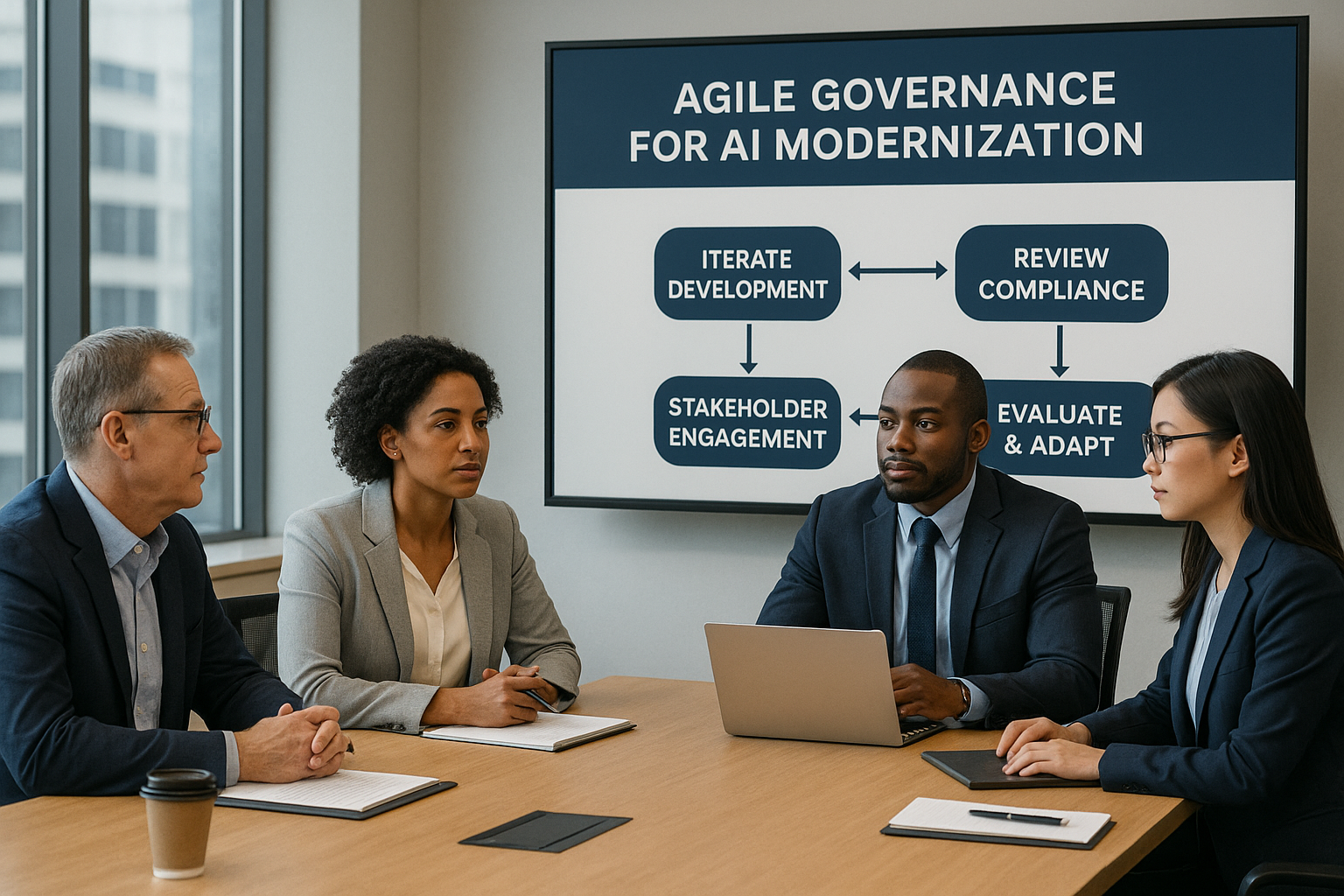Key Takeaways
- Agile Governance for AI Modernization adapts to the dynamic nature of AI, allowing for flexible responses to changing requirements and compliance needs.
- Traditional project management fails in AI due to its inflexible structure; Agile allows for continuous adaptation throughout the project lifecycle.
- Halyard’s Agile model integrates ethical considerations early, embedding compliance and stakeholder engagement into every phase of development.
- Agile provides a disciplined approach for change, enabling organizations to pivot swiftly without sacrificing momentum or transparency.
- In the AI era, modernization emphasizes continuous negotiation between capability, compliance, and community trust, positioning Agile as a strategic advantage.
In the context of AI-enabled modernization, Agile is not merely a procedural framework; it is an adaptive governance architecture designed to manage complexity, volatility, and accelerated innovation. The stakes are particularly high for public agencies, educational institutions, and mission-driven organizations, sectors where the technology being deployed intersects with policy imperatives, compliance frameworks, and public accountability.
While Agile originated in software development, its principles have evolved to address the distinct challenges of AI integration: unpredictability in algorithmic performance, rapid iteration in model training, evolving ethical guidelines, and the need for stakeholder trust. Halyard Consulting has adapted Agile to meet these realities, creating an approach that is both technically rigorous and strategically resilient.
Why Traditional Project Management Fails in AI Modernization
In conventional “waterfall” project delivery, requirements are documented at the outset, and delivery occurs in a single, monolithic release. This approach assumes that the operational environment, technology stack, and regulatory conditions will remain stable from start to finish. In AI initiatives, that assumption is not only flawed, it is often fatal to the project’s relevance.
AI systems are inherently dynamic. A model trained today may require recalibration tomorrow due to new data, evolving user behavior, or legislative changes. A rigid plan cannot accommodate this without incurring costly delays, technical debt, or outright obsolescence.
For example, consider a municipal agency deploying an AI-driven public service chatbot. Between the project’s initiation and delivery, new accessibility regulations may be enacted, public sentiment toward AI could shift, or unexpected language support requirements might emerge. A waterfall approach would necessitate large-scale rework at the end of the project, whereas Agile allows for these changes to be incorporated incrementally, reducing both cost and disruption.
Agile as a Governance Model for AI
Halyard’s interpretation of Agile in the AI context is not limited to sprint cadences and backlog management. It is a governance model that embeds compliance, stakeholder engagement, and continuous validation into the delivery lifecycle.
Each sprint functions as a closed-loop system:
- Define a small set of high-value deliverables aligned with both strategic goals and compliance requirements.
- Deliver functional increments that are integrated into the operational environment for real-world testing.
- Evaluate through structured stakeholder feedback and data analysis.
- Refine the backlog, reprioritizing work to reflect new insights or external changes.
This governance-centric Agile model transforms modernization into a sequence of deliberate, evidence-based advancements rather than a leap of faith toward a fixed, and potentially outdated, endpoint.
The Intersection of Agile and Ethical AI
Ethical considerations are amplified in AI projects, where bias mitigation, transparency, and privacy are not optional; they are mission-critical. Traditional project methodologies treat ethics as a discrete compliance checkpoint, often near the end of the build. In Agile, these considerations are integrated from the first sprint forward.
At Halyard, ethical AI principles are embedded in backlog prioritization, user story development, and testing protocols. For instance, if an algorithm is intended to assist in public benefits eligibility decisions, bias detection models are run continuously, not post-launch. This ensures that any drift in fairness metrics is identified and corrected before it can materially impact citizens.
Adaptability as a Strategic Advantage
One of the most underestimated benefits of Agile in AI modernization is its ability to absorb external shocks without jeopardizing momentum. Whether the trigger is a change in federal funding priorities, a sudden security vulnerability, or the emergence of a more efficient AI model, Agile’s iterative nature allows organizations to pivot without dismantling their entire delivery structure.
This adaptability is not synonymous with improvisation. Agile creates a disciplined structure for change; decisions are made based on empirical data, documented governance, and stakeholder consensus. In sectors where transparency is as important as performance, this disciplined flexibility is a competitive advantage in itself.
Conclusion: Redefining Modernization for the AI Era
In the AI era, modernization is not a linear progression toward a fixed state; it is an ongoing negotiation between capability, compliance, and community trust. Agile is the only methodology that treats change not as a threat to the project but as a source of strategic advantage.
By reframing Agile as a governance model, Halyard Consulting enables clients to deliver AI-enabled transformations that are not only technically advanced but also resilient, transparent, and ethically sound.
Related Reading: Agile at Halyard Consulting: A Strategic Framework for AI-Enabled Transformation

